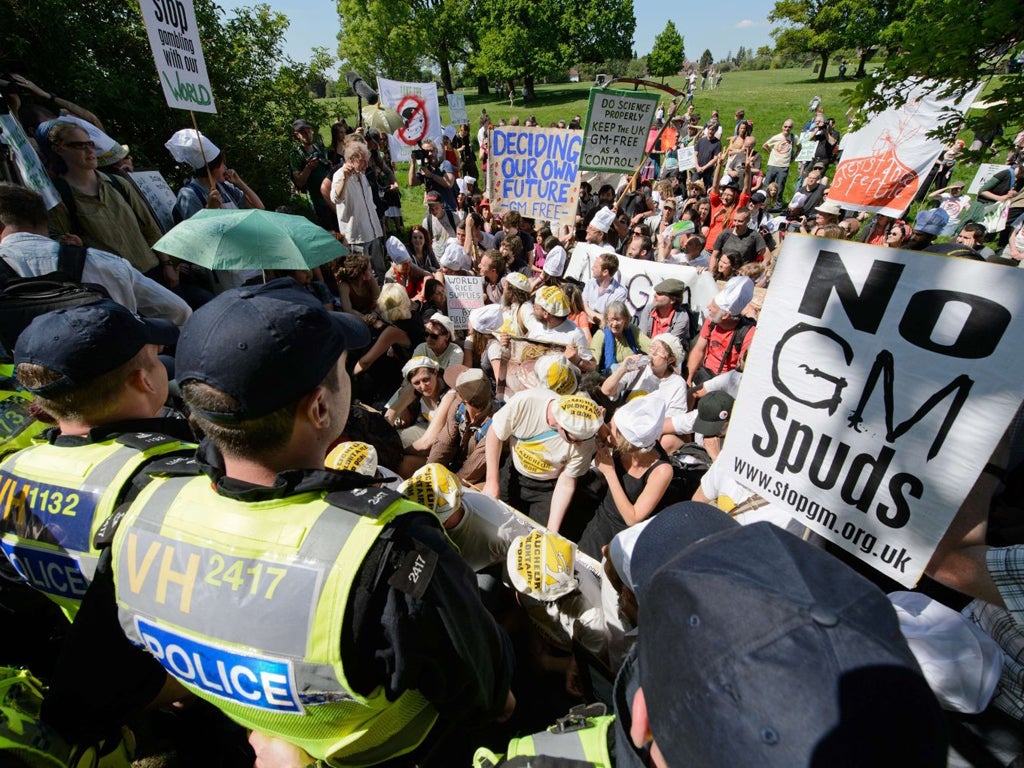Heavy police presence thwarts anti-GM protest
Faced with a major security operation, campaigners withdraw to fight another day

Your support helps us to tell the story
From reproductive rights to climate change to Big Tech, The Independent is on the ground when the story is developing. Whether it's investigating the financials of Elon Musk's pro-Trump PAC or producing our latest documentary, 'The A Word', which shines a light on the American women fighting for reproductive rights, we know how important it is to parse out the facts from the messaging.
At such a critical moment in US history, we need reporters on the ground. Your donation allows us to keep sending journalists to speak to both sides of the story.
The Independent is trusted by Americans across the entire political spectrum. And unlike many other quality news outlets, we choose not to lock Americans out of our reporting and analysis with paywalls. We believe quality journalism should be available to everyone, paid for by those who can afford it.
Your support makes all the difference.Underneath a cloudless sky and surrounded by the greenest of English landscapes, the two opposing forces assembled their ranks on a plot of land in the middle of Hertfordshire like two medieval armies readying themselves for battle.
On the one side stood the scientists of Rothamsted Research (motto: where knowledge grows). On the other, the less-disciplined ranks of an anti-GM movement known as Take the Flour Back (motto: cows on the grass, not cows in the grass).
In between them stood the not-so-thin blue line of the police, who appeared to have everything under control.
For this was no Bosworth Field or Agincourt and Appletree field, where Britain’s first trial of GM wheat is taking place, had for the moment escaped the threatened “decontamination” by the anti-GM activists who had vowed to destroy a crop they said contains cow genes.
A band of about 200 activists were outmanouevered - and probably outnumbered - by a major security operation involving scores of police and private security guards who successfully prevented anyone getting near Appletree field in the grounds of Rothamsted where several small test plots of GM wheat are growing.
The local council had been given permission by the Home Secretary over the weekend to impose a restriction zone around the site which allowed the police to stop people using the public footpaths leading through Rothamsted’s land.
As a police helicopter clattered overhead, the leader of the Rothamsted experiment, Professor Maurice Maloney, explained this morning to a small group of journalists allowed through the 2-metre-high fence surrounding the GM site why the research was necessary.
He said that the modified wheat contains an extra gene that allows the plant to exude a harmless insect pheromone that deters aphids, a major wheat pest, and testing the technology in the field is the only way of judging whether it will work in real life as opposed to in the lab or glasshouse.
“If this works, it’s one way of substantially reducing the amount of pesticides used on crops. What we are doing is putting a ‘no parking’ sign on the leaves to deter aphid attacks,” Professor Maloney said.
The scientists at Rothamsted, he insisted, are environmentalists at heart and take offence at being categorised as purveyors of an evil technology that harms both human health and wildlife.
“It’s difficult to understand the criticism. Most scientists at Rothamsted would say that they are the greenest people on the planet,” Professor Maloney said.
Rothampsted scientists have tried to engage Take the Flour Back in a meaningful dialogue but this has only been met with threats of destroying the crop which culiminated in yesteday’s abortive attempt by the group to penetrate the site, he said.
In a public park adjacent to Rothampsted, the supporters of Take the Flour Back assembled under the shade of oak trees where they sang songs, listened to anti-GM speeches and eat organic bread rolls and vegetable soup.
“We’re here because every section of British society has rejected GM technology and this is a deliberately provocative act,” said Theo Simon, a veteran anti-GM campaigner.
He told his supporters that it is not always the best tactics to go for direct action, at least not at the moment.
Both sides hailed the protest as peaceful, although two men were arrested on suspicion of public order offences. A spokeswoman for Hertfordshire Police said they were “within the confines of the trespass banning areas”.
Join our commenting forum
Join thought-provoking conversations, follow other Independent readers and see their replies
Comments